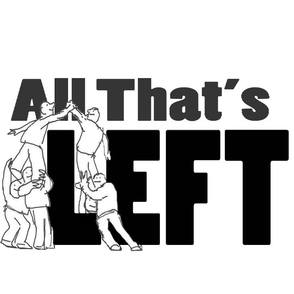|
This piece originally appeared at JewSchool.com Not too long ago, members of All That’s Left (ATL) wrote about “Who We Are” despite the fact that we decided early on that we were interested in defining ATL’s aims not who ought to be in it. It reads: All That's Left members come from a variety of political, ideological and personal backgrounds, including non-Zionists, Liberal-Zionists, Anti-Zionists, Socialist-Zionists, Zionists, Post-Zionists, one, two, some, and no staters and everything in between. The common thread in our work, actions, and connections is our unequivocal opposition to the occupation and our focus on the diaspora angle of resistance to the occupation rooted in the notion that all people(s) are equal.  We wrote the note in order to clarify that the collective is made up of folks from a spectrum of backgrounds who are working to end the occupation. In the end, the “Who We Are” note essentially says: “We aren’t defining who we are.” Instead, we define ATL in a sentence (All That’s Left is a collective unequivocally opposed to the occupation and committed to building the diaspora angle of resistance) in order to create a way for people to self select. It's important to note that ATL is not an organization; it is a collective of individuals that come together around our unequivocal opposition to the occupation and focus on building the diaspora angle of resistance. That's the only statement we have or will make as a collective. All of the actions we do are actions that members of ATL have done, not an ATL organization (no such organization exists). It is an important distinction to make here because I am only really speaking for myself as a member of ATL. I am in no way a spokesperson or official rep. ATL’s roots are in the need that we saw to make it easier to connect people coming from elsewhere to the anti-occupation movement in Israel and/or Palestine. The collective started collecting in January 2013 with the aim of aggregating information on platforms such as facebook and twitter about tours, learning opportunities, events, and actions that oppose the occupation and/or educate about the reality at hand; to fill some of the gaps between already existing anti-occupation groups without being redundant. Almost immediately members started thinking about organizing unique actions and opportunities to connect the diaspora to the anti-occupation movement.
I’ve had conversations with people who say that it isn’t enough to say that you are opposed to the occupation. People tend to get uncomfortable considering the reality that all the ideologies listed in that "who we are" note are diverse and can be subdivided even further. We have had conversations at meetings here or there about what justice means, what peace means, what the occupation is, and more. Some people suggest that a collective such as ours needs further definition given that the spectrum on these issues runs from “there is no such thing as the occupation” to “everything from the river to the sea is occupied.” As far as I can tell we have a definition (reminder that I am a member of the collective not a spokesperson or official rep): The occupation that we are talking about together, and unequivocally opposed to, is the reality that people are living under martial law and under siege without civil or human rights. Our aim as a collective is to connect diaspora folks through learning and action to ending that reality. This model of building a collective of individuals around a single statement has been inspired in many ways by the kind of self-organizing models that the (in this case ironically named) occupy movement(s) took on. There is less process and more experimentation, there is organic culture and vision-making toward building shared goals, as opposed to fully fleshed out and declared goals in order to build common culture. It is a very different model compared some of the models that many activists (myself included) in many movements are used to organizing within, but it is working. To be sure, both organizing models are important ways of struggling for justice. The model we are using seems to be a good one in our process of building a broad platform for diaspora folks to get involved in ending the reality in which millions of people live under martial law without rights (ie. the occupation). There may be others in ATL with other opinions, but again the collective comes together around a particular statement that leaves much to the culture, analysis, strategy, and visions of the members of the collective, but it is not a fully blank slate. After all, we know we are unequivocally committed to ending the occupation and focused on building the diaspora angle of resistance.
0 Comments
Your comment will be posted after it is approved.
Leave a Reply. |
Archives
May 2022
|
© 2022 A. Daniel Roth
 This work is licensed under a Creative Commons Attribution-NonCommercial-NoDerivatives 4.0 International License. |
